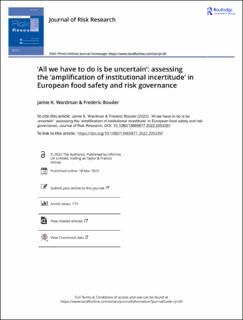| dc.contributor.author | Wardman, Jamie K. | |
| dc.contributor.author | Bouder, Frederic Emmanuel | |
| dc.date.accessioned | 2023-01-26T09:03:09Z | |
| dc.date.available | 2023-01-26T09:03:09Z | |
| dc.date.created | 2022-04-13T13:16:41Z | |
| dc.date.issued | 2022 | |
| dc.identifier.citation | Wardman, J. K., & Bouder, F. (2022). ‘All we have to do is be uncertain’: assessing the ‘amplification of institutional incertitude’in European food safety and risk governance. Journal of Risk Research, 25(8), 1008-1022. | en_US |
| dc.identifier.issn | 1366-9877 | |
| dc.identifier.uri | https://hdl.handle.net/11250/3046471 | |
| dc.description.abstract | This paper addresses efforts made by the European Food Safety Authority (EFSA) in recent years to foreground the identification, representation, and public disclosure of scientific uncertainty in its risk assessment procedures and communications, a process aptly characterised in this paper as the ‘amplification of institutional incertitude’. We argue that while the introduction of EFSA’s novel uncertainty reforms has opened a welcome space for academic and policy dialogue, this strategic initiative will nevertheless struggle to reconcile ongoing stakeholder concerns about the legitimacy, direction, and authority of the agency’s scientific opinions and expert advice. We observe that the instigation of EFSA’s uncertainty reforms is prefigured by a longstanding policy tension running at the heart of the agency’s directives requiring officials to be both open and transparent on the one hand, whilst being free from political influence and remaining distanced from risk management decisions on the other. The uncertainty reforms adopted may accordingly be understood as a way for EFSA to reconcile a current ‘uncertainty paradox’ facing the agency by accommodating wider concerns about uncertainty and opening itself up to further scrutiny of its risk assessment processes without relinquishing independence. We argue that prior policy tensions are unlikely to be resolved by simply ‘being uncertain’ however, because this prescriptive ‘solution’ offers only limited congruency with the wider problem diagnoses facing the agency. Moreover, we caution that as institutional incertitude is increasingly amplified, EFSA will in turn be further prompted to rethink and refresh its stakeholder engagement initiatives in order to improve its standing in the food safety field amidst ongoing criticisms and calls for greater inclusion, oversight, and input that follow. Finally, we offer some policy recommendations and highlight the need for future lines of research inquiry to take greater account of the socio-political context in which the assessment and communication of uncertainty takes place. | en_US |
| dc.language.iso | eng | en_US |
| dc.publisher | Routledge | en_US |
| dc.rights | Navngivelse 4.0 Internasjonal | * |
| dc.rights.uri | http://creativecommons.org/licenses/by/4.0/deed.no | * |
| dc.title | ’All we have to do is be uncertain’: assessing the ‘amplification of institutional incertitude’ in European food safety and risk governance | en_US |
| dc.title.alternative | ’All we have to do is be uncertain’: assessing the ‘amplification of institutional incertitude’ in European food safety and risk governance | en_US |
| dc.type | Peer reviewed | en_US |
| dc.type | Journal article | en_US |
| dc.description.version | publishedVersion | en_US |
| dc.rights.holder | The author | en_US |
| dc.subject.nsi | VDP::Samfunnsvitenskap: 200 | en_US |
| dc.source.journal | Journal of Risk Research | en_US |
| dc.identifier.doi | 10.1080/13669877.2022.2053391 | |
| dc.identifier.cristin | 2017183 | |
| cristin.ispublished | true | |
| cristin.fulltext | original | |
| cristin.qualitycode | 1 | |

